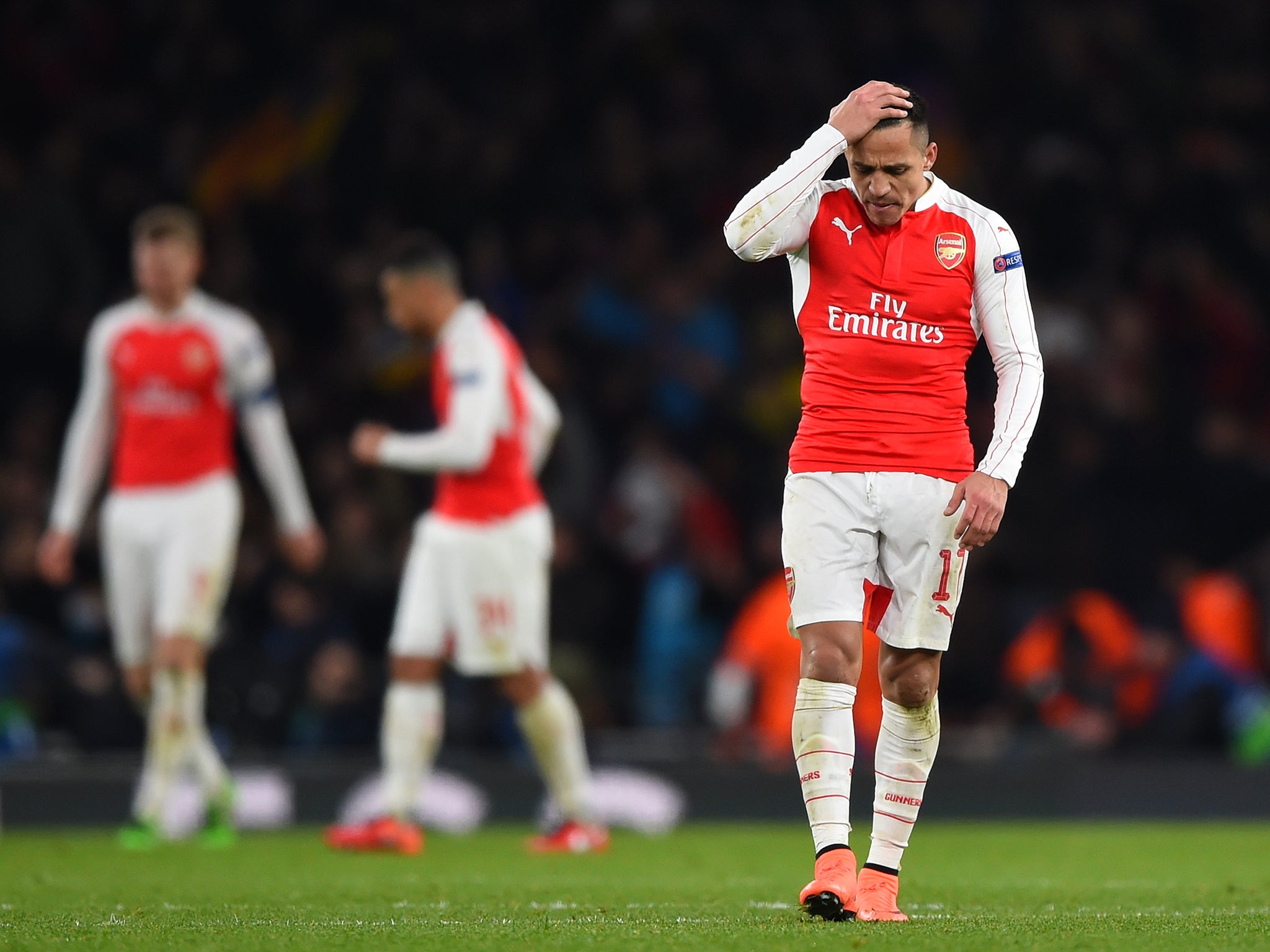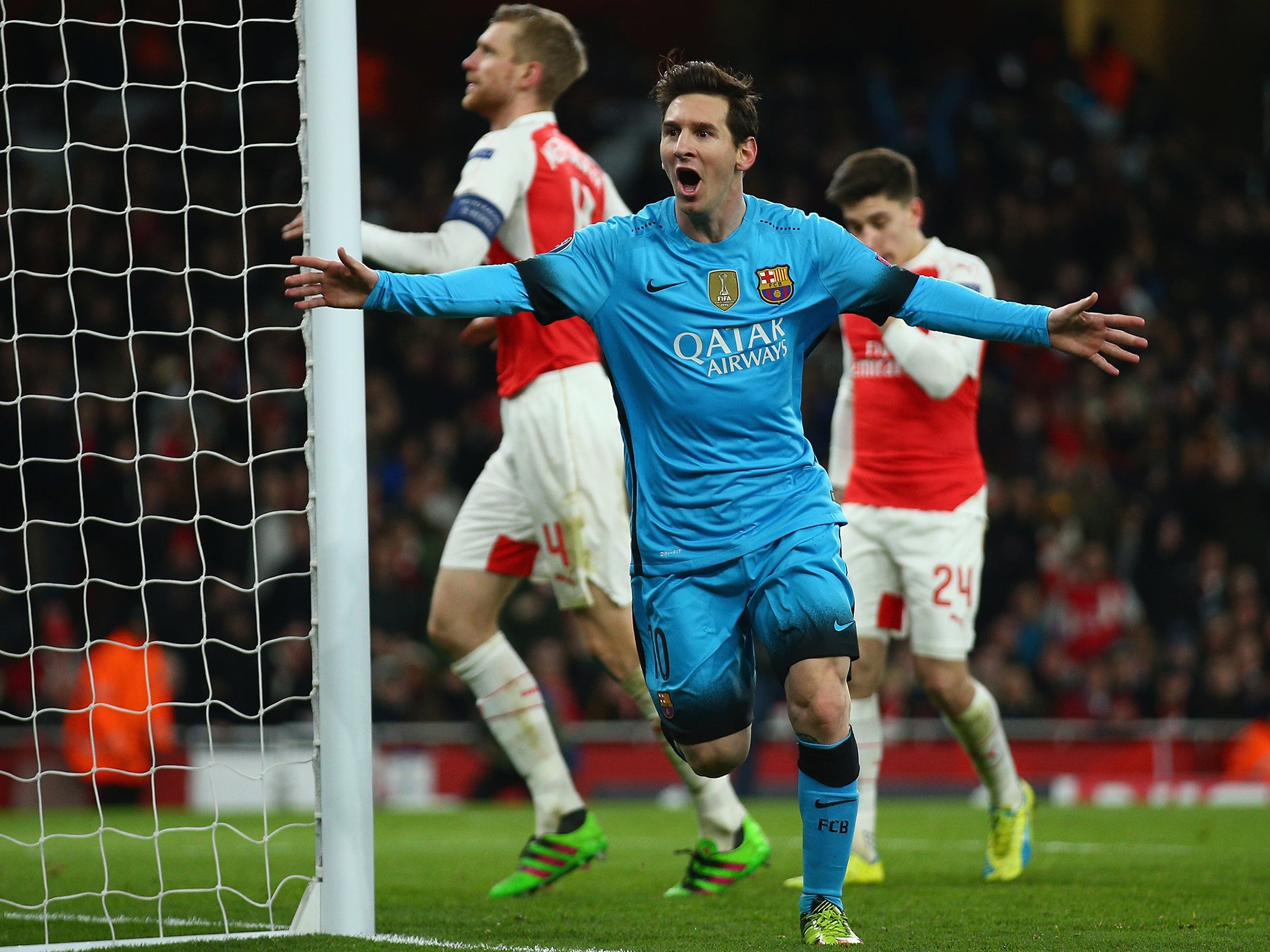Arsenal beat themselves on Tuesday – they tend to panic if they do not take an early lead, Danny Higginbotham
INSIDE FOOTBALL: Arsenal do not learn. On Tuesday the players decided they had to win on the night

Your support helps us to tell the story
From reproductive rights to climate change to Big Tech, The Independent is on the ground when the story is developing. Whether it's investigating the financials of Elon Musk's pro-Trump PAC or producing our latest documentary, 'The A Word', which shines a light on the American women fighting for reproductive rights, we know how important it is to parse out the facts from the messaging.
At such a critical moment in US history, we need reporters on the ground. Your donation allows us to keep sending journalists to speak to both sides of the story.
The Independent is trusted by Americans across the entire political spectrum. And unlike many other quality news outlets, we choose not to lock Americans out of our reporting and analysis with paywalls. We believe quality journalism should be available to everyone, paid for by those who can afford it.
Your support makes all the difference.Barcelona are a brilliant side full of world-class players, but on Tuesday night Arsenal effectively knocked themselves out of the Champions League, and not for the first time.
This was the fourth year in a row when Arsenal lost their last-16 first leg at home, simply because they were too desperate to win a game they could have drawn. In each of the last three years, a 0-0 at the Emirates, combined with their second leg away result, would have sent them through to the quarter-finals.
But this Arsenal team do not learn. They are an experienced side, not that you would not know it from how they play: naive, panicky and anxious, especially at home and also when they do not take an early lead. This is more likely than anything else to cost them the Premier League title this season.
Arsène Wenger’s side go to Manchester United on Sunday and if it is 0-0 at half-time, as it often is at Old Trafford these days, Arsenal must keep their heads, stay calm, and not chase the game so hard they expose themselves to the counter-attack.
That is what happened on Tuesday. Wenger said before the game that 0-0 at home “is not a bad score”, and that his team had caused their own problems recently by conceding in the first leg. And in the first half, Arsenal looked to have taken that message on board. They were tactically perfect, and did not allow Barcelona a single shot on target. When one full-back went forward, the other one stayed back. When one central midfielder attacked, the other one sat. The game plan was working.
But when Arsenal get to half-time at 0-0 something happens. On Tuesday the players decided they had to win on the night. Instead of digging in and holding on to their 0-0, they tried to go hell for leather, opening themselves up to the counter-attack. All their discipline and compact organisation went out of the window.
Even though Barcelona had more possession, they knew they could wait for Arsenal to expose themselves to the break. Javier Mascherano admitted as much. So it proved when, after 71 minutes, Per Mertesacker took himself out of the game, giving Barcelona a 3 v 3 situation which they fully exploited. Another mistake by Mertesacker gifted Barcelona’s second.
When Arsenal go to the Nou Camp on 16 March they have to win, knowing if they attack they will get picked off. A 0-0 draw would have been a very different story.
Unfortunately, this has been the story of Arsenal’s last three years in the Champions League. They keep knocking themselves out by losing the first leg at home, because they are too desperate for a lead.
Last year Arsenal lost 3-1 to Monaco at home, before winning 2-0 away and going out on away goals. In 2014 they lost 2-0 to Bayern Munich, before drawing 1-1 away. The year before that they lost 3-1 at home to Bayern, and won 2-0 away. In each of those years, their second-leg result would have sent them through if only they had drawn 0-0 at home. But they did not have the intelligence or patience to manage that.

This problem goes far deeper than those four games. Arsenal are a team who need to take an early lead, or else they panic and cause themselves problems. Look at their home record in the Champions League group stage since the start of the 2010-11 campaign. In 13 games they have been ahead at half-time, of which they have won 12 and drawn one. But in the eight games where they have been drawing at half-time, they have won only three, and lost four. In the four games where they have been behind at half-time, they have lost three. Clearly, this is a team that struggles when they have to chase the game in the second half. No team in Europe are more vulnerable when attacking than Arsenal.
The same thing holds in the Premier League. They have won all seven home games this season when they had the lead at the break. But they did not win either of the games when it was level at half-time, and have won just once out of four from behind.
There is a glaring lack of game management and intelligence in this team, and a desperate rush to desperate measures when the game is still in the balance.
When things are not going your way, you need good leaders, talkers and organisers, to make sure that the team keep their heads. Arsenal teams used to have that, players like Tony Adams, Patrick Vieira, Martin Keown, Emmanuel Petit and Gilberto Silva in the spine of the team. But now they do not.
Mertesacker is an experienced defender who has won a World Cup, but he has been in and out of the team so is more worried about his own game than anyone else’s. Laurent Koscielny is a fantastic defender but even Wenger has admitted he is not a talker. Hector Bellerin and Francis Coquelin are just young players who still need direction. But if every man plays his own game, the team are exposed.
Arsenal need to win at Old Trafford, far more than United do. Ten of the last 12 games at Old Trafford have been 0-0 at the break. If this one is too, Arsenal need to stay calm.
Allardyce’s defensive nous will keep Sunderland up
This is a big day for Sam Allardyce, taking his Sunderland back to Upton Park, where he was in charge for four years. He has made a real difference at Sunderland, which is why they will stay in the Premier League.
Attacks win you titles, but good defences keep you in the league. Allardyce seems to have grasped that better than any other manager in the relegation zone. That is why they signed two defenders in January, Lamine Koné and Jan Kirchhoff, both of whom have impressed me so far. Their big rivals Newcastle, in contrast, have conceded just one goal fewer, but signed attacking players last month, Andros Townsend, Jonjo Shelvey and Seydou Doumbia.
I don’t think that is the right approach. The hard fact is you cannot score your way out a relegation battle, but you can defend your way out of it. Just look at Queen’s Park Rangers, where Charlie Austin had a brilliant season last year, scoring 18 Premier League goals. They finished rock bottom.
Allardyce’s teams have the mentality that they go on with one point, and they fight to keep hold of that. Thirty-eight clean sheets mean 38 points, as he always says. A strong Allardyce team reminds me of Stoke in our first season in the Premier League. We were defensively strong, first and foremost, and it kept us up. I think the same thing will happen for Sunderland.
Join our commenting forum
Join thought-provoking conversations, follow other Independent readers and see their replies
Comments